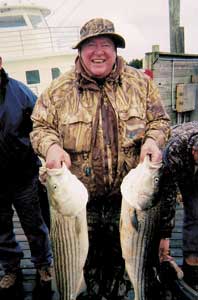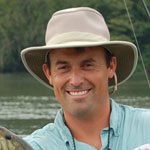
Spring, summer and fall attract anglers and boaters to the bodies of water throughout the state.
Although some winterize their boats awaiting springtime, others never miss a beat on the water.
From late fall through early spring, anglers are few and far between at lakes, rivers, estuaries, and ocean. However, fishing can be outstanding during the wintertime, although, winter fishing is much different from spring and summertime patterns.
For instance, redfish school in the flat waters of bays in tight groups, and speckled trout gang up in deep holes adjacent to the inlets, sucking in the occasional fish or crustacean.
Striped bass move into the waterways near bridges and structures, feeding heavily on small fish in preparation for their upriver spring trips to spawn.
Black sea bass and gray trout congregate at inshore reefs, gobbling up available shrimp; baitfish taking refuge at reef structures.
Experienced winter anglers can cash in on a smorgasbord of reel pleasures without the aggravation of wave runners, pleasure boaters, and other anglers crowding the waters.
Winter temperatures cool the waters where the boats float and introduce another factor to consider seriously. The chilly waters of the winter put many anglers at risk, regardless of health and ability to swim.
With the waters warming in the Carolinas to the upper 70s and 80s during the peak of the summer, an accidental immersion by an angler is usually comical and allows companions to chuckle and snicker the rest of the day.
A video camera is never pointed in the right direction or is even aboard to catch these bloopers. In fact, falling in 80-degree water is more refreshing than dangerous in the summer. Grave dangers only arise in heavy current challenged by solo anglers.
However, sliding off the upper deck into the chilly waters during the winter or early spring can be extremely dangerous and can cause death. All anglers should exercise caution when waters are cold.
A few precautions and emergency items may save you or your fishing partner’s life.
The unpleasantly cold waters of winter can immobilize even the best swimmers in the best of health.
Swimming in 78-degree water is completely different from 50-degree water. The human body goes through a state of shock when unexpectedly entering frigid waters.
As a person immerses, the body experiences cold shock where the extreme temperatures cool the skin triggering a cluster of autonomic responses.
Initially, a victim involuntary gasps for air sending the body into a hyperventilated state. Prolonged hyperventilation decreases the dissolved carbon dioxide levels in the blood and raises blood alkalinity, which causes muscle cramps and cerebral vasoconstriction that starves the brain of oxygen.
At this point, the lack of oxygen to the brain leaves the victim disoriented and confused. To make things worse, the heart rate instantly increases two-fold and blood pressure spikes.
Cold surrounding the extremities causes blood vessels to contract. The cardiovascular system is under intense stress increasing the risk of cardiac arrest.
If a swimmer is fortunate enough to be swim to high ground, the second killer lurks if emergency care isn’t underway pretty soon.
Hypothermia kills after the core body temperature drops to a dangerous level. The human body can regulate core temperature for a short time immersed in icy water.
But emergency medical care is needed if the core body temperature drops to dangerous levels.
Happily, most will survive if they are treated early enough. In fact, there are even cases where it’s better to be dunked in cold water. Children, and some adults, who’ve fallen into cold, deep lakes and ponds have been found up to 30 minutes later and revived — with no brain damage.
Most cold-water deaths occur in the United States involve water temperatures between 45 and 65 degrees Fahrenheit. That means Carolinas anglers are at risk from October through late April or early May.
Some of the best fishing is during the cooler months of the year that also coincides with the dangers of cold water. But usually there are fewer people on the water during the winter when hypothermia is a risk.
Typically, most anglers choose their fishing days to coincide with warm, comfortable weather.
But remember the water is still cool and an angler should be cautious. Nobody ever plans to fall into the water, but accidents happen.
Anglers should prepare themselves for immersion during the winter by bringing a few safety items along, including: a change of clothes, instant heat packs or hot hands, a solar blanket, wool toboggan and wool socks.
If you fall in the water, the first plan of action is to remove all wet clothing, change into dry cloths putting the wool toboggan and wool socks first. Heat is quickly lost or retained from the head and feet.
And never fish solo during the winter.
A fishing buddy along if fishing or not could save your life.
A cell phone or VHF radio could be used for a 911 rescue-call if prolonged exposure occurs. It also never hurts to wear a personal floatation device or life jacket during the winter or anytime of year to keep you afloat.
Remember, fishing is supposed to be fun during cool or warm conditions.
Take the danger out of cool water fishing by taking a few precautions for your wintertime fishing trips.




Be the first to comment